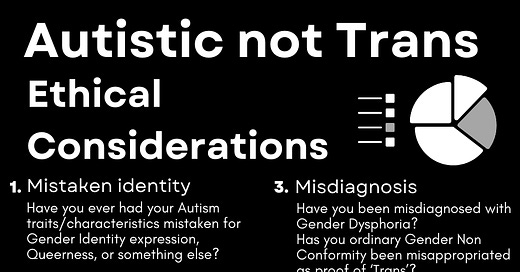Autism and Gender Ideology: Why Misdiagnoses Harm Autistic Individuals
Autism vs Trans Ideology: Ethical Concerns and the Need for Clearer Boundaries
Autism and Gender Ideology: Why Misdiagnoses Harm Autistic Individuals
Autistic individuals often display gender nonconformity and socially nonconforming behaviours as natural aspects of being autistic (it is also natural in all humans). These traits, while integral to the autistic experience, are sometimes misinterpreted or misappropriated under the umbrella of gender expression, often leading to profound ethical and clinical concerns.
The rising conflation of autistic traits with gender identity expression - particularly within the context of trans advocacy - has led to a troubling trend of autistic individuals being misdiagnosed with Gender Dysphoria or labelled as "trans" or “queer” due to behaviours or characteristics that are quintessentially autistic. This not only undermines autistic identity but also prevents many autistic individuals from accessing the autism-specific support they genuinely need.
People saw my non compliance with gender norms as a stance against my sex. But I was just being autistic. WE'RE GENDER NON CONFORMING!
Key Concerns:
Mistaken Identity: Autism traits such as rigid thinking, sensory sensitivities, and struggles with social norms are sometimes misread as gender expression or queerness. This conflation risks erasing the unique aspects of autistic identity.
Appropriation of Autism: Autism is sometimes used as evidence for ideological concepts, such as “gendered souls” or “wrong bodies,” which misrepresents the neurological basis of autism and erases its unique identity.
Professional Ignorance: Clinicians and therapists may fail to recognise autism when these traits are perceived through the lens of gender diversity. This can result in inappropriate support or outright neglect of the individual's autistic needs.
Misdiagnosis: The misappropriation of ordinary gender nonconformity or other autistic traits as "proof" of being transgender can lead to unnecessary and potentially harmful treatments, overshadowing the real source of distress - autism-related challenges. This includes the dismissal of autism-related gender dysphoria, which requires a tailored approach.
Recognition of Autistic Identity: Autism must be respected as a unique neurological condition, separate from social or ideological narratives.
Barriers to Autism Diagnosis: Many autistic individuals are overlooked for autism assessments because their traits are instead interpreted through the lens of gender ideology, delaying access to critical support. This delay or denial of diagnosis leaves autistic people without the critical support they need. This is especially prevalent in autistic females, who don’t usually get diagnosed until later in life which leads to compounded mental health issues and misdiagnoses before finally realising the patient is autistic. The majority cohort of patients in gender clinics today is females, and a high percentage of them present with autistic traits - it is a disgrace that this is not being addressed when we already have mountains of evidence about misdiagnoses and the poor outcomes from this in autistic females going unrecognised and unsupported until later in life.
Ethical Concerns in Care: Trans advocacy narratives have claimed that addressing autism-specific needs constitutes “conversion therapy.” This mischaracterisation prevents autistic individuals from receiving the proper support they need for their neurological condition.
This issue raises significant ethical concerns. Misinterpreting autism as gender identity denies autistic individuals their right to proper understanding, advocacy, and support. It also leaves them vulnerable to interventions that fail to address their autism-specific struggles, including the unique forms of gender dysphoria and body dysmorphia some autistic people experience.
I'm disgusted with the cowardice of the main autism charities who'd rather play politics than protect their own.
Call to Action:
To address these concerns, we must ensure that autism is understood and supported on its own terms, without being conflated with unrelated ideological frameworks.
We must stand together as advocates for autistic identity, ensuring that autism is not subsumed or overshadowed by unrelated social narratives. Recognising and respecting the distinctiveness of autistic traits is critical. This means advocating for:
Proper Training for Professionals: Clinicians and therapists must be educated to differentiate between autistic traits and expressions of ‘gender identity’.
Ethical Practices: Misdiagnoses stemming from conflations between autism and gender must be addressed, and proper support for autism-specific challenges must be prioritised.
Raising Awareness: The autistic community and its allies must amplify this issue to preserve autistic identity and ensure autistic voices are heard in these conversations.
Let us work together to prevent the erasure of autism under any other label and to advocate for ethical, informed, and supportive care for all autistic individuals. Share your story, raise your voice, and help create change.
It’s time to push back against the trans narrative that is co-opting autism, silencing our unique voices, and distorting vital autism information. For far too long, trans activists have used autism to further their agenda while vilifying anyone who dares to speak out.
It is important to address the growing concerns about the conflation of autism with gender identity, which has led to the misrepresentation of autistic traits and the suppression of essential autism-related information. Efforts to associate autism with broader social narratives have, at times, resulted in the overshadowing of autistic voices and the dismissal of those raising valid concerns. Initiatives such as “Autistic Not Queer” and “ND without the T” aim to advocate for the distinct recognition of autism as separate from gender-related frameworks. By focusing on accurate representation and fostering constructive discourse, we can ensure that autism is not overlooked or misunderstood.
For me, gender transition felt like a cure for autism. But it was just another mask.
You can take part in Gender Critical Autistic Voices INTERVIEWS here







I've had the same thought that gender is "just another mask"